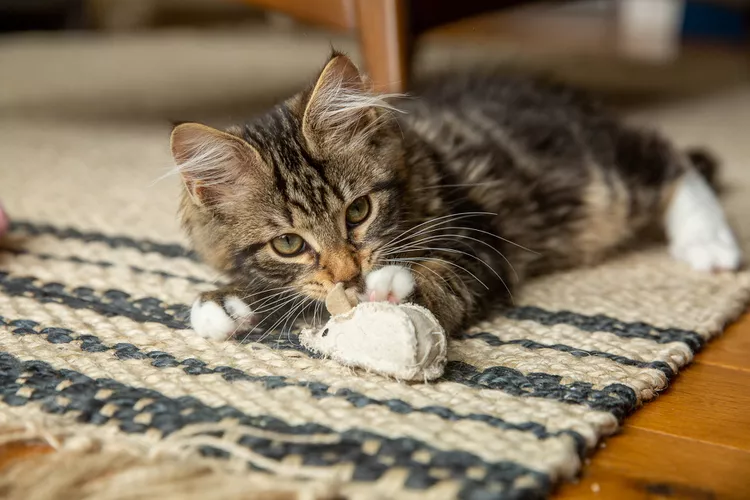
As you probably already know, cats make a variety of noises. Some breeds, such as Siamese cats, are known to be naturally noisy, but any cat can meow loudly for a number of reasons.
Although you may find excessively loud meowing to be annoying, it may also be an indication that your cat isn't feeling well.
Pay attention to your cat and what else is happening while it's crying. If you can figure out the reason for your kitty's loud meowing, you might just be able to stop it.
Aside from body language, meows are a cat's primary mode of communication. A meow can come in many forms and for many different reasons. Most healthy cats are usually attempting to communicate something when they meow. For instance, your cat may be trying to tell you that it's hungry, stressed out, scared, excited, or that it simply wants some of your time and attention.
Meows may also sound slightly different from one another based on the reasons behind them:
Some cats are born deaf, whereas others may become deaf over time. A deaf cat may not even realize it's making a sound when it meows. This makes it very difficult to interpret what the cat is trying to tell you through its vocalizations.
A deaf cat's meows are often much louder than those of a non-deaf cat as well because it doesn't know it's deaf and can't control the volume of its voice. This might be really obvious when your deaf cat can’t see you and is trying to find you.
Similar to people who have Alzheimer’s disease, your pets can develop cognitive dysfunction as they get older. As a disease process, it's not completely understood. But it may cause your cat to appear confused and to vocalize more than it used to. Some cognitively dysfunctional cats also stare while meowing loudly, especially at night.
If you think you may have pinpointed the reason for your cat's loud meowing, then you may be able to stop it by making a few changes to its routine and environment.

10 Obscure, Little-known Canine Facts in Honor of National Dog Day
With National Dog Day upon us, it's time to celebrate everything about our favorite pets—even the weirder stuff. Here are 10 obscure facts about dogs you probably didn't know.
Exploring the Different Types of Pet-Friendly Beaches
Are you looking for pet-friendly beaches? Learn about the different types of pet-friendly beaches, their locations, and tips for visiting them with your pet.
Toxic Chemicals & Household Items That Can Poison Dogs
There are many things in and around your home that can endanger your dog. Learn which chemicals and household items can poisin your dog.
Bronchitis in Dogs
Is your dog coughing and feeling unwell? It could be due to respiratory inflammation called bronchitis. Learn the causes, treatment, and prevention.
Choking in Dogs
A dog can occasionally swallow something incorrectly and start choking. Find out how you can tell if your dog is choking and what you can do about it.
Why Does My Dog Smell So Bad?
Does your dog smell? Find out what could be causing these unpleasant odors and if it's something that needs more than just a bath to fix.
Is Rosemary Safe for Dogs?
Rosemary is used both for cooking and as a supplement with many reported health benefits in people, so you may be wondering if it is safe to give to your dog. Rosemary is considered non-toxic for dogs but with some caveats.
Can Dogs Eat Blueberries?
Dogs can safely eat blueberries. Blueberries are packed with nutrients and can be a great addition to your dog's diet when fed in moderation. Learn more about the benefits, risks, how to incorporate blueberries into their diet, and other fruits dogs can eat.
Dog Food Basics
Are you feeding your dog the best way possible? Check out these dog feeding tips to keep your dog healthy and happy.
Swedish Vallhund: Dog Breed Characteristics & Care
The Swedish vallhund makes for a high-energy and affectionate companion. Learn about the breed's history, health, exercise needs, and more.
Becoming a Show Dog: Getting Started
Do you have the perfect puppy? Have you considered showing her in a dog show? There's much more to showing than showing up! Here's how to get started.
How to Care for a Hairless Cat
Hairless cats make great pets but they aren't without their own challenges and requirements. Read on to learn how to best care for your furless feline.
British Shorthair: Breed Profile, Characteristics & Care
The British Shorthair is a calm, affectionate cat that looks and feels like a plush teddy bear. Here's what you need to know about this popular breed, including appearance, temperament, health, and care.
Tonkinese: Cat Breed Profile, Characteristics & Care
The Tonkinese cat is a perfect mix of the Siamese and Burmese—smart, sociable, and sweet. Learn about the Tonkinese breed.
How to Stop Your Cat From Chewing Electrical Cords
Cats are known to pounce and attack inanimate objects, like electrical cords. Learn how to prevent your cat from ambushing objects that may harm it.
How to Stop Aggression in Kittens
Kittens may show aggressive behavior for several reasons. Sometimes their play gets too aggressive while other times the kitten is afraid or upset. Learn how to spot and curb aggression in kittens.
46 Egyptian Cat Names
Whether inspired by notable Egyptian deities, locales, or pharaohs, Egyptian cat names can bring out the divinity of your noble feline companion.
How to Tell If a Kitten is a Boy or a Girl
If you're wondering whether your new kitten is a boy or a girl, here are three ways to help determine the sex of your cat.
Signs Your Cat Is Aging and When to See the Vet
Expect some changes when your cat ages. Learn to differentiate between normal and potential medical problems for your elderly cat.
Coronavirus in Cats
Feline coronavirus (FCoV) rarely harms cats but can lead to another life-threatening illness. Learn the causes, treatment, and prevention.